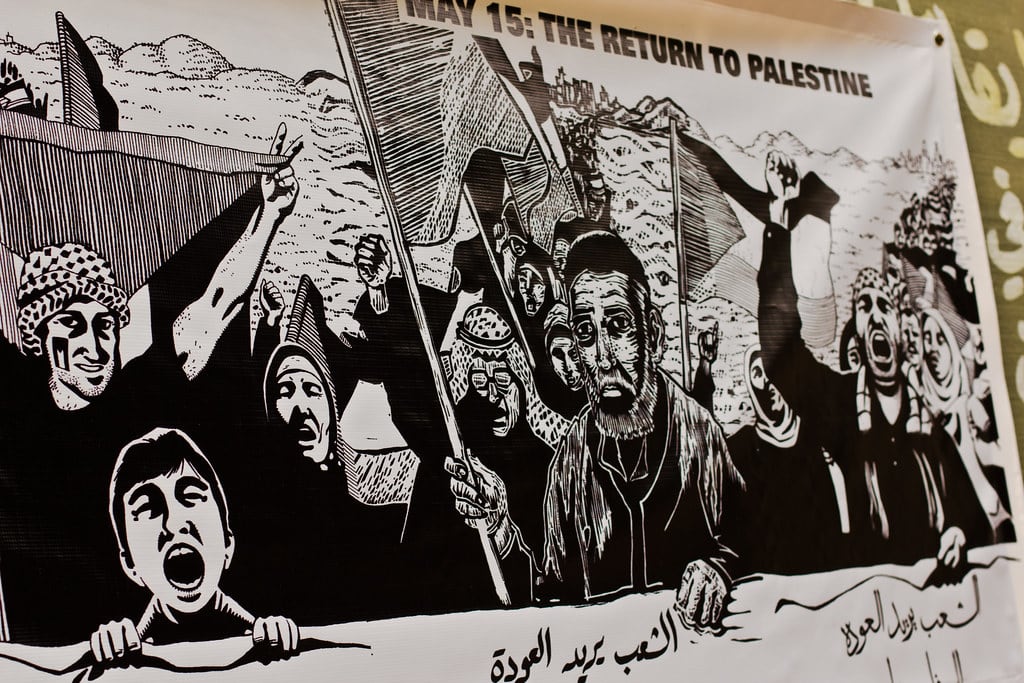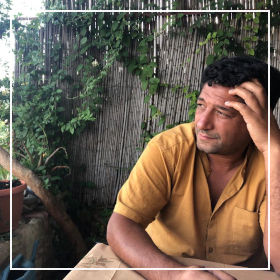“We stand with Palestine, whether right or wrong!” (nahnu m‘a falastîn zâlimâ aw mazlûma) is a phrase uttered in 1974 by former Algerian president Houari Boumediene. It has since become a credo in Algeria. That same year, Yasser Arafat, leader of the Palestine Liberation Organization (PLO), then described as a terrorist, came to the UN for the first time to take part in debates concerning Palestine. This historic decision was taken on the initiative of the President of the 29th session of the UN General Assembly – Abdelaziz Bouteflika, Algeria’s Minister of Foreign Affairs and Houari Boumediene’s right-hand man – despite opposition from Israel and the United States.
Yasser Arafat’s speech still resonates strongly with today’s sad reality:
“I am a rebel, my cause is freedom. Many of you in this room have experienced the same situation as I have: the position of resistance in which I find myself and in which I must fight. You too have had to fight to make your dreams a reality. Today, you must share my hope. Mr. President… [turning to Abdelaziz Bouteflika, then to the audience] I have come with an olive branch in one hand, a fighter’s rifle in the other. Do not let the olive branch fall from my hand! Do not let the olive branch fall from my hand! Do not let the olive branch fall from my hand!”
Since then, Palestine has become an observer member of the UN, but the colonial process has continued, the olive branch has fallen, its bearer has died in troubled circumstances and the olive groves have continued to be monopolized and destroyed to terrorize Palestinians.
We have been told to accept Israel’s right to defend itself, even though this can only mean one thing: the Palestinians have the right to die in silence.
The formula – “We stand with Palestine, whether right or wrong!” – is far from being the counterpart of “unconditional support for Israel”. It was uttered by a person who knew full well what it meant to fight against colonialism, and against the processes of moral disqualification of national liberation struggles. Houari Boumediene was also a former officer of the Armée de Libération Nationale (ALN), the armed wing of the Algerian Front de Libération Nationale (FLN), according to the Algerian point of view… or of a terrorist movement according to the point of view, at the time, of the occupying power (France). This fact is not unique to Algeria. Many national liberation movements – such as Nelson Mandela’s ANC – have been described as terrorist groups.
To say that “We stand with Palestine, whether right or wrong!” is to say how aware we are, as anthropologists, researchers and citizens, of the mechanisms used to delegitimize the Palestinian cause, as has been the case for other causes of national liberation.
We have been called upon to condemn the acts of terror of Hamas by the very people who have been complicit, or silent, during the decades (75 years) of terror inflicted by Israel on the Palestinians, and in particular the Gazans.
We were told to believe that Hamas in no way represented the Palestinians, without once hearing the point of view of the main people concerned: the Palestinians.
We were told not to publicly express our solidarity and affection for Gaza and Palestine.
We have been told to accept Israel’s right to defend itself, even though this can only mean one thing: the Palestinians have the right to die in silence.
As Gilles Deleuze wrote in 1983: “It’s a genocide, but one in which physical extermination remains subordinate to geographical evacuation: as Arabs in general, the surviving Palestinians must blend in with the other Arabs” (Deleuze 1983).
To say “We stand with Palestine” is to begin adopting a somewhat emic perspective, an approach dear to the anthropologist. It’s worth noting that the day after October 7, no official spokesperson for Palestine (members of Fatah, the rival branch of Hamas) – whether the current Palestinian ambassador to France, the former Palestinian representative in France, Leila Shahid, or Riyad Mansour, the Palestinian ambassador to the United Nations – condemned the attack on Israel. Not that they did not have any compassion for the Israeli victims. But they know better than anyone that any unilateral condemnation – any condemnation of the death of Israeli civilians, without taking into account the thousands of Palestinians murdered by the colonial state and the effects of an occupation lasting almost 75 years – is a discharge to Israel in its call for “unwavering support to defend itself”, in the words of the Israeli ambassador to the UN Security Council.
Palestinians know very well, from experience, what this means in practice. What’s more, although the UN Security Council was not unanimous in its condemnation of Hamas, this in no way prevented Israel (with the backing of the USA and Europe) from imposing a total blockade (water, food, electricity, gas) on the entire population of Gaza, and from continuously bombing buildings in Gaza, claiming thousands of victims, mainly civilians – many of them children. What would have happened if the UN Security Council had aligned itself with the Israeli – and therefore American and European – position?
“We are not subhumans” was Riyad Mansour’s strong statement to the UN Security Council (October 8, 2023), one day before the Israeli Defense Minister dared to bluster publicly about the siege of Gaza: “We’re fighting animals, so we’re going to treat them like animals”. A phrase whose genocidal intent is obvious.
To say “We stand with Palestine” is to begin adopting a somewhat emic perspective, an approach dear to the anthropologist.
As for the reactions of the political and media authorities in North America and Europe, they have only confirmed the abysmal hypocrisy between the values they promote and practice. They have only contributed to opening a little wider “the gates of hell on Gaza”, to propagating even further an “atmosphere of the end of the world” for an entire “orphaned childhood”, to quote Frantz Fanon. In his book Sociologie d’une révolution (1959), about the Algerian War of National Liberation (1954-1962), Frantz Fanon explained the types of war crimes perpetrated in the name of “democracy”, the feelings and desire for revenge that they necessarily nourished among the first victims: the children.
“Swedish journalist Christiana Lilliestierna spoke to some of the thousands of Algerian refugees in a camp. Here’s an excerpt from her report: “Next on the chain is a seven-year-old boy with deep wounds made by a steel wire with which he was bound while French soldiers abused and killed his parents and sisters. A lieutenant forcibly held his eyes open, so that he could see and remember for a long time… “This child was carried by his grandfather for five days and nights before reaching the camp. “The child said: “I only want one thing: to be able to cut a French soldier into small pieces, very small pieces.” How easy do you think it is to make this seven-year-old forget both the murder of his parents and his enormous revenge? Is this orphaned childhood, growing up in an atmosphere of the end of the world, the message that French democracy will leave behind?” (Fanon, 1959 : 11).
On the contrary, in the Global South, but also here and there in Europe and North America, these reactions from political and media authorities have helped even more to demystify “definitively the most alienated of the colonized” (Fanon, 1961). Here again, and in conclusion, a comparison with the Algerian War of National Liberation is useful, and in particular this passage by Frantz Fanon (Les damnés de la terre 1961), concerning the gap between discourse and practice when it comes to the equality between humans:
“As soon as the colonized chooses counter-violence, police reprisals mechanically call for reprisals by national forces. There is no equivalence of results, however, as strafing by aircraft or cannonading by the fleet surpass in horror and importance the colonized’s responses. This to-and-fro of terror definitively demystifies the most alienated of the colonized. On the ground, they see that all the talk of human equality piled one on top of the other does not mask the banality of the fact that the seven Frenchmen killed or wounded on the Sakamody pass arouse the indignation of civilized consciences, while the sacking of the Guergour douars and the Djerah dechra, and the massacre of the very people who had motivated the ambush, “count for nothing” (Fanon, 1961 : 86).





